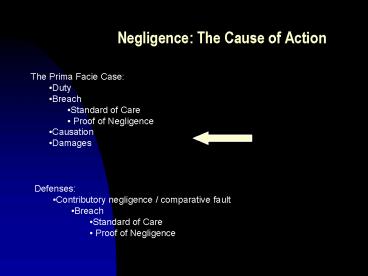Negligence: The Cause of Action - PowerPoint PPT Presentation
1 / 13
Title:
Negligence: The Cause of Action
Description:
(Theory: Constructive notice -- Reasonable person would have seen it and cleaned it up) ... Inference: a conclusion the jury is permitted, but not required, to draw. ... – PowerPoint PPT presentation
Number of Views:37
Avg rating:3.0/5.0
Title: Negligence: The Cause of Action
1
Negligence The Cause of Action
- The Prima Facie Case
- Duty
- Breach
- Standard of Care
- Proof of Negligence
- Causation
- Damages
- Defenses
- Contributory negligence / comparative fault
- Breach
- Standard of Care
- Proof of Negligence
2
Negligence D. Proof of Negligence
Burden of Proof Burden of producing
evidence Burden of persuasion by a
preponderance of the evidence
3
Ch II. D. Proof of Negligence Relevance
Relevance evidence is relevant if it has any
tendency, no matter how slight to prove a fact
that is in issue. The question Does the
evidence increase the trier of facts assessment
of the probability that the fact to be proven is
true?
4
Ch II. D. Proof of Negligence Evidence
- Three types of evidence
- Documentary, or real
- Direct
- Circumstantial
5
Ch II. D. Proof of Negligence Inferences
Target Fact (determined by theory of case)
Evidentiary Fact
Somewhat more likely
6
Negligence D. Proof of Negligence
Somewhat more likely
Target Fact (determined by theory of case)
Evidentiary Fact
Baby food has been there a long time
Baby food is dirty and messy No one heard it fall
Somewhat more likely
(Theory Constructive notice -- Reasonable
person would have seen it and cleaned it up)
7
Negligence D. Proof of Negligence
Somewhat more likely
Target Fact (determined by theory of case)
Evidentiary Fact
Notice of recurring condition
Food is frequently spilled
Somewhat more likely
Theory negligent business practice rule
8
Negligence D. Proof of Negligence
Res ipsa loquitur sed quid in infernos dicet?
9
Negligence D. Proof of Negligence
Somewhat more likely
Target Fact (determined by theory of case)
Evidentiary Fact
Defendant was careless in handling the barrel
Barrel fell from warehouse
Somewhat more likely
10
Negligence D. Proof of Negligence
Res ipsa loquitur 1) The accident must be of a
kind which ordinarily does not occur in the
absence of someones negligence. 2) The accident
must be caused by an agency or instrumentality
within the exclusive control of the defendant. 3)
The accident must not have been due to any
voluntary action or contribution on the part of
the plaintiff.
11
Res Ipsa LoquiturThe Foundational Facts
Defendant failed to use reasonable care
A particular accident occurred
Somewhat more likely
If 1) When occurs, usually result of
negligence, 2) Defendant in exclusive control
of instrumentality, and 3) Not due to
plaintiffs voluntary contribution
12
Negligence D. Proof of Negligence
Burden of Proof Burden of producing
evidence Burden of persuasion Inference meets
the burden of producing evidence Presumption
shifts the burden of producing evidence
13
D. Proof of Negligence
Inference a conclusion the jury is permitted,
but not required, to draw. Presumption affecting
the burden of producing evidence a conclusion
the jury is required to draw, unless evidence is
introduced to rebut the conclusion (to prove,
that is, that the conclusion is not
correct). Presumption affecting the burden of
proof a conclusion the jury is required to draw,
unless the rebutting evidence shows that more
likely than not, the conclusion does not follow.































